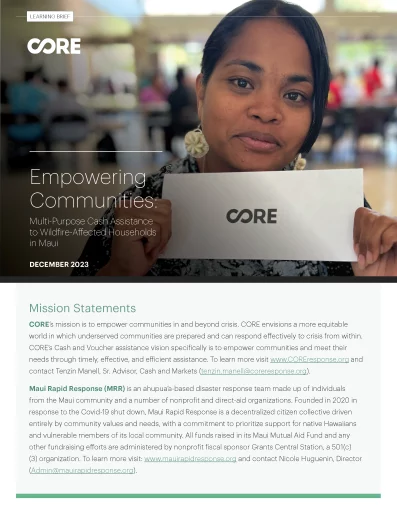Empowering Communities: Multi-purpose cash assistance to wildfire-affected households in Maui
On August 8, 2023, catastrophic wildfires in Maui County, Hawaii spread rapidly due to intense winds brought on by Hurricane Dora, devastating the town of Lahaina and causing widespread displacement across communities. It ranks as one of the 10 deadliest wildfires in US history since 1871 and the largest natural disaster in Hawaiian history. 80% of Lahaina was consumed by the fires, including over 800 businesses affecting 7,000 employees and over 2,000 homes. The daily total business revenue of those establishments was an estimated $2.7 million USD a day. As of September 2023, over 7,000 displaced individuals were placed in non-congregant shelters. The wildfires took the lives of 99 people.
CORE promptly engaged with Hawaii Voluntary Organizations Active in Disaster (HIVOAD), local partners, and personal connections among staff and board members to understand immediate needs and provide effective support. With an influx of off-island volunteer teams offering in-kind assistance which caused logistical challenges, local partners urgently requested cash assistance as a more practical solution that would support affected households’ preferences and priorities. Given CORE’s experience in wildfire response and preference for cash assistance whenever feasible, CORE was well-suited to step in, collaborate with local partners, and assess its next steps.
CORE’s on-site assessments confirmed that the island’s markets were operational and validated the explicit request for cash aid from Hawaii VOAD and other local organizations. Despite the extreme post-wildfire landscape and near complete destruction of residences, CORE staff were able to reach and visit affected individuals in Lahaina to identify their needs. It was evident that in addition to communities living directly in Lahaina being the hardest hit, other marginalized and minority communities who lived elsewhere, but whose livelihoods were based in Lahaina, were also severely affected. Many from this affected community only used cash which they kept in their homes, and did not use the formal banking system. When their homes were destroyed they lost all their savings. Critical needs identified included: food, housing, transportation, fuel, clothing, communications, school supplies, baby supplies, and livelihoods opportunities.
To address these needs, CORE worked with local implementing partners to provide cash assistance to those impacted by the wildfire and piloted a home sharing program to potentially provide a solution to the lack of long-term housing options and pre-existing housing crisis. CORE utilized internal funding to deliver cash assistance to support 100 affected households to meet their basic needs immediately after the disaster. In addition, CORE committed to improving four homes to accommodate a larger household size due to displaced friends or family members; the pilot allowed 26 displaced individuals (seven families) to have mid-term housing. This learning brief focuses specifically on lessons pertaining to CORE’s cash assistance and includes recommendations for scaling cash and/or voucher assistance in similar contexts.



